How CEOs Manage Their Time
Time management skills are essential for efficient leaders. Learn the best practices for managing your time to be a successful CEO.
According to Janine Schindler, Forbes contributor, time management is essential to being a successful Chief Executive Officer (CEO). This probably comes as no shock to you, seeing that CEOs are constantly busy. But just how busy are they, and where does all their time go?
According to a Harvard Business Review study by Michael E. Porter and Nitin Nohria, the average CEO works 9.7 hours/weekday. On top of that, 79% of them said they also worked on weekends, and 70% said they worked during their vacation time. Overall, Porter and Nohria’s study found that CEOs worked an average of 62.5 hours/week.
With so many hours designated to work each week, you may be wondering what all this time goes to. According to the same study:
- Face-to-face interactions take up 61% of CEOs time
- Reading emails and talking on the phone take up 15% of CEOs time
- Other forms of electronic communication take up 24% of CEOs time
What does that leave CEOs with?… Barley anytime to sleep, eat three full meals a day, and spend time with their family and friends. So, CEOs must implement all the best tips for effective time management to avoid being consumed by work.
11 tips for managing your time as a CEO
Learning how to time-manage is difficult for everyone, nevertheless a busy CEO. But time management is a crucial skill that all leaders need to know. So, here are 10 tips to help you better manage your time as a CEO…
- Plan your week in advance
- Schedule think (or strategy) time
- Include buffers between meetings
- Avoid the lure of email
- Be agenda driven
- Limit routine responsibilities
- Make time to connect with others
- Spent time designing, monitoring
- Find time for customers
- Stay highly visible during crises
- Make time for personal well-being
1 Plan your week in advance
While some CEOs prefer to spend time each Sunday evening or Monday morning to plan their schedule, Amanda Goetz, the founder of House of Wise, says that to maintain a work-life balance, she plans her next day before signing off the previous day. There is no right or wrong time to plan. As long as you dedicate the required time to plan, find what works for you!
“Planning is so important when molding a successful future-oriented organization.” – Janine Schindler.
2 Schedule think (or strategy) time
Sometimes we get so caught up in scheduling meetings that we forget to take the time to think and strategize about our day. Goetz says to prioritize her time ruthlessly, she avoids scheduling meetings before 11:30AM; “I get that time to push things forward, that takes my brainpower, and I’m on offence,” says Goetz. Lastly, make sure there is always a meeting agenda in place for the meetings you attend.

No agenda, no attenda
Make the best use of your time by having a meeting agenda with clear objectives and next steps by using a tool like Fellow!

3 Include buffers between meetings
Including a buffer between meetings will help avoid Zoom fatigue. The symptoms of Zoom fatigue usually consist of feeling exhausted or burnt out, constantly rescheduling video calls, and keeping your camera off during meetings.
When a buffer is not possible, suggest changing the meeting format to a phone call. If all else fails, ask the meeting attendees if everyone could turn their cameras off. Although this may not be ideal for engagement, it will help minimize Zoom fatigue.
4 Avoid the lure of email
According to Porter and Nohria, while emails can cut down on face-to-face interactions, they also interrupt your workflow and often lead you down a rabbit hole of emails, wasting time.
“Email interrupts work, extends the workday, intrudes on time for family and thinking, and is not conducive to thoughtful discussions. CEOs are endlessly copied on FYI emails. They feel pressure to respond because ignoring an email seems rude.”
5 Be agenda driven
In a 62.5 hour/week job, one can only imagine how many priorities a CEO must keep track of. Thus, Porter and Nohria suggest being agenda (or calendar) driven to remain organized. According to their study,
“An explicit agenda is one of the CEO’s most important tools for making progress on multiple work streams simultaneously, addressing differences in the rate of progress across priorities, and using time effectively despite the need to respond personally to unforeseen events.”
6 Limit routine responsibilities
Porter and Nohria’s study found that routine duties consumed 11% of CEOs studied. These duties included things from operating reviews to earnings calls. So, to limit these responsibilities, they suggest evaluating which activities fall under routine and which fall under necessary. Those activities that fall under routine, try changing them to a more efficient strategy or removing the routine altogether.
“They must ask whether it serves an important purpose or is simply a company habit, something instituted by the predecessor, or a carryover from the CEO’s previous role.”
Additionally, don’t be afraid to delegate. Delegating work, especially routine responsibilities, can help you save time and get more important things done. Consider hiring an executive assistant (EA) to help with these administrative tasks and everyday to-dos. Here is a list of potential interview questions to help you find the best EA.
7 Make time to connect with other managers
According to Porter and Nohria, connecting with other managers helps CEOs understand things from an employees’ perspective by taking them out of their bubble.
“Relationships with employees at multiple levels also build a CEO’s legitimacy and trustworthiness in the eyes of employees, which is essential to motivating them and winning their support.”
8 Spent time designing, monitoring, and improving processes
While designing, monitoring, and improving processes can become time-consuming, it will save you time and resources in the long run. For example, according to Porter and Nohria, formal reviews help monitor the company’s processes but take up a quarter of a CEO’s total work time. Thus, find a time when your workload is lighter and dedicate this time to designing, monitoring, and improving processes.
“Though these consume a quarter of a CEO’s total work time, they allow CEOs to track progress, provide regular feedback, uphold high standards, and ensure timely course corrections.”
9 Find time for customers
As a CEO, it’s important to spend time with your customers – After all, you wouldn’t have a successful company without them! However, according to Porter and Nohria’s study, only 3% of CEOs spend time with their customers. Thus, CEOs need to start designating more time for their customers.
10 Stay highly visible during crises
Way too often, CEOs stay in their bubble and avoid their employees. However, this only creates distance and resentment from employees towards upper management/CEOs. Thus, CEOs need to be visible and involved in the company.
This is especially important during a crisis because being visible and involved showcases that you care about the company and what happens. It also makes the employees feel more supported by having their CEO help them remedy the situation.
11 Make time for personal well-being
With roughly 60 hours/week allotted to work, it can become challenging for CEOs to find time for themselves. However, finding that alone time is crucial to maintain a healthy well-being. Here are four tips according to Whitney Johnson and Amy Humble, Harvard Business Review contributors, to help you take care of your personal well-being:
- Provide time for self-care
- Ask for help if you need it
- Ask others how they are doing
- Search for the positives in your day (and say them out loud)
Parting advice
CEOs are constantly busy. Whether you’re jumping into a meeting, finishing up a phone call, or getting caught up on the endless paperwork and emails you receive daily; the job is always time-consuming. Thus, knowing the best practices to manage your time as a CEO will help make the most out of your day and hopefully cut down on some of those long hours.







![7 Meetings Every CEO Should Lead [+ Free Templates]](https://fellow.app/wp-content/uploads/2022/08/Meetings-Every-CEO-Should-Lead-2.jpg)

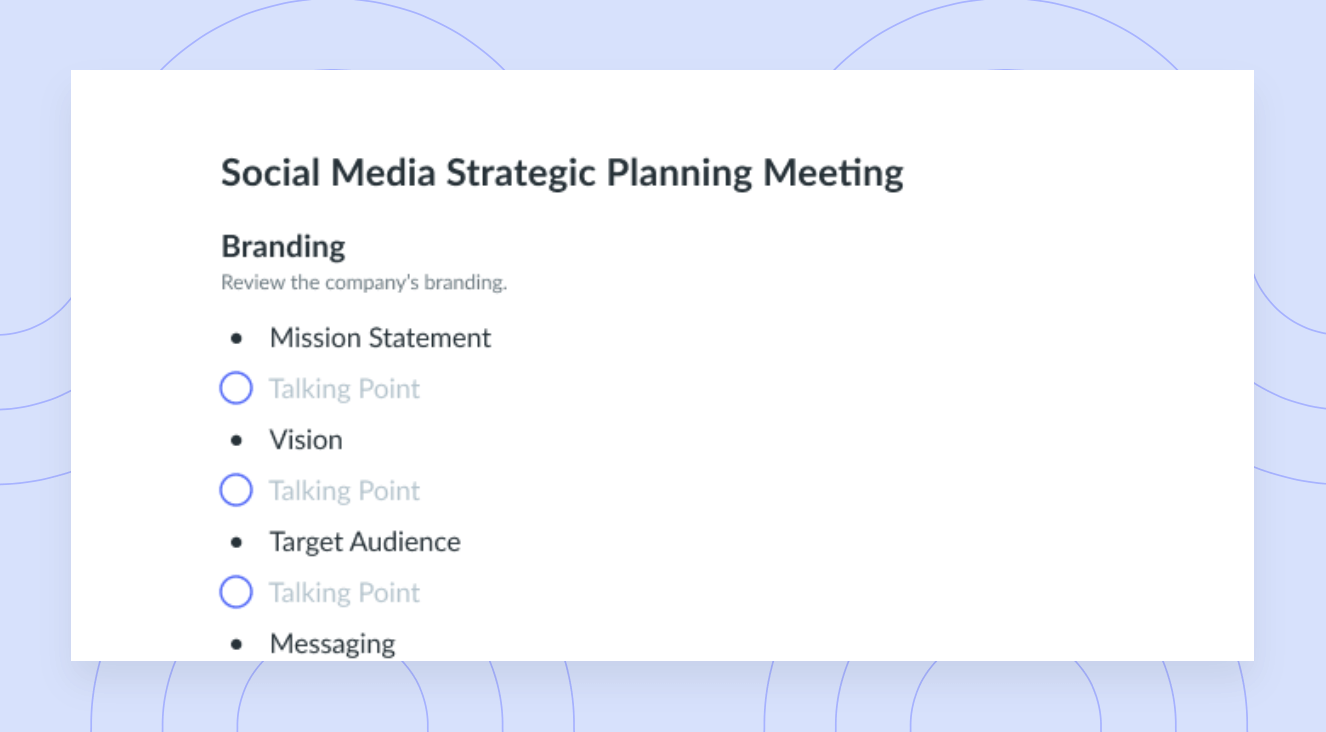
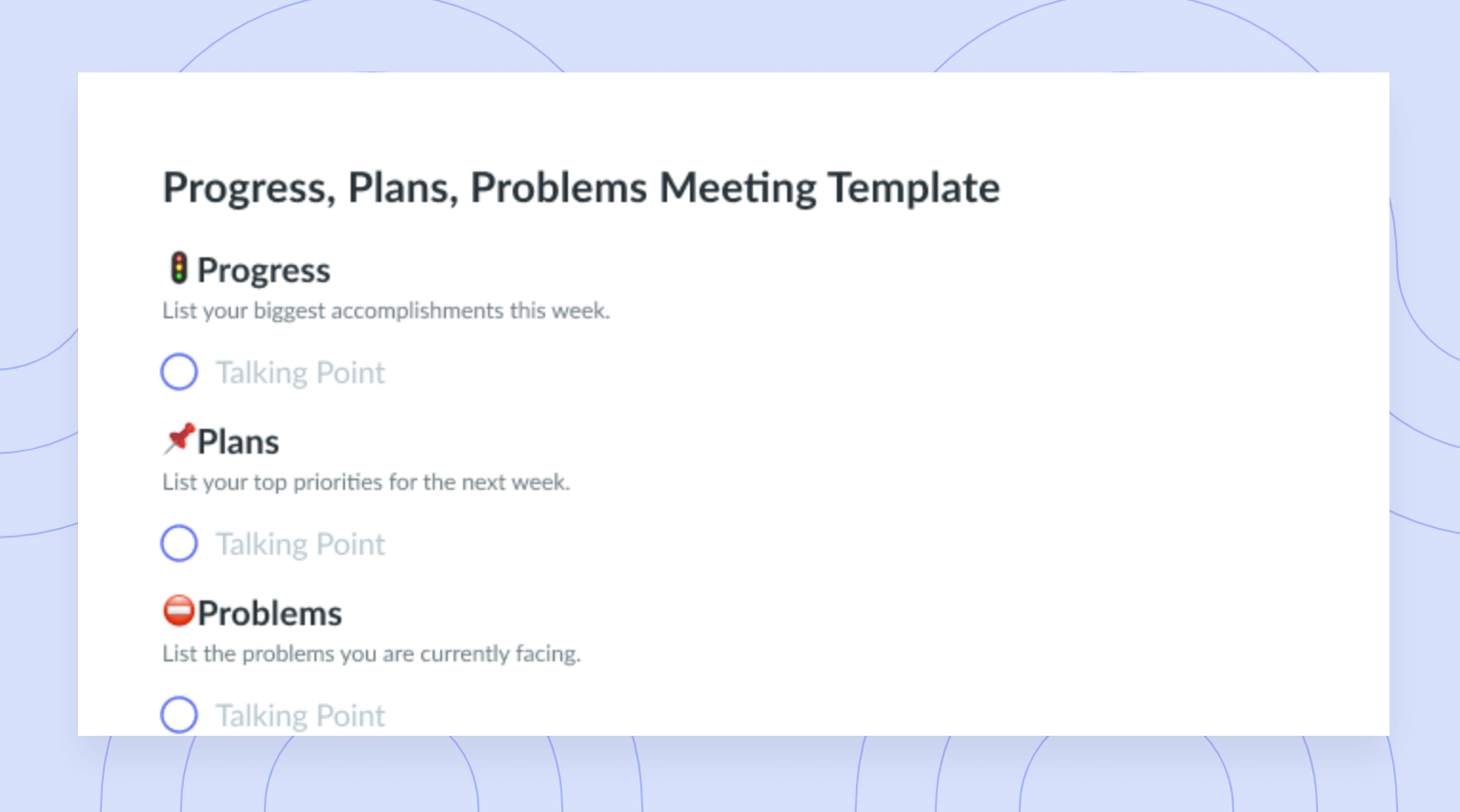
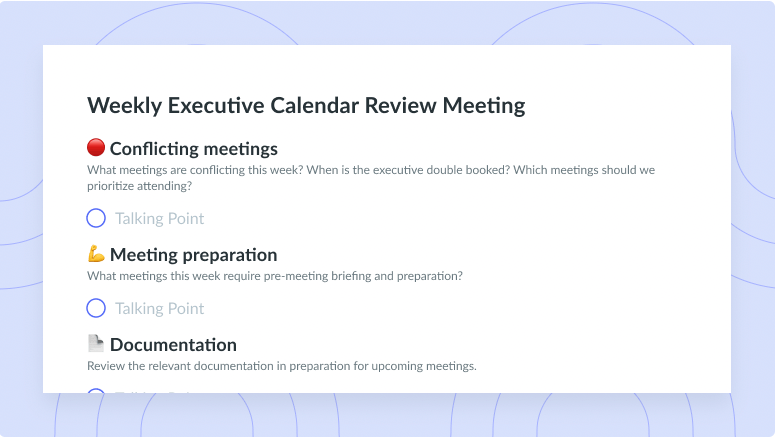
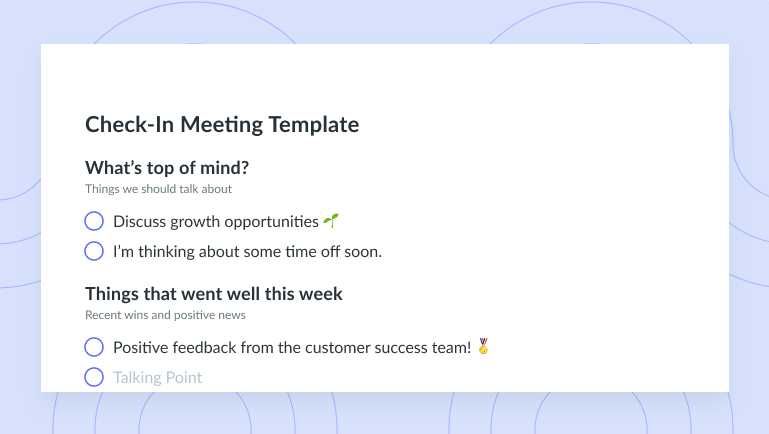
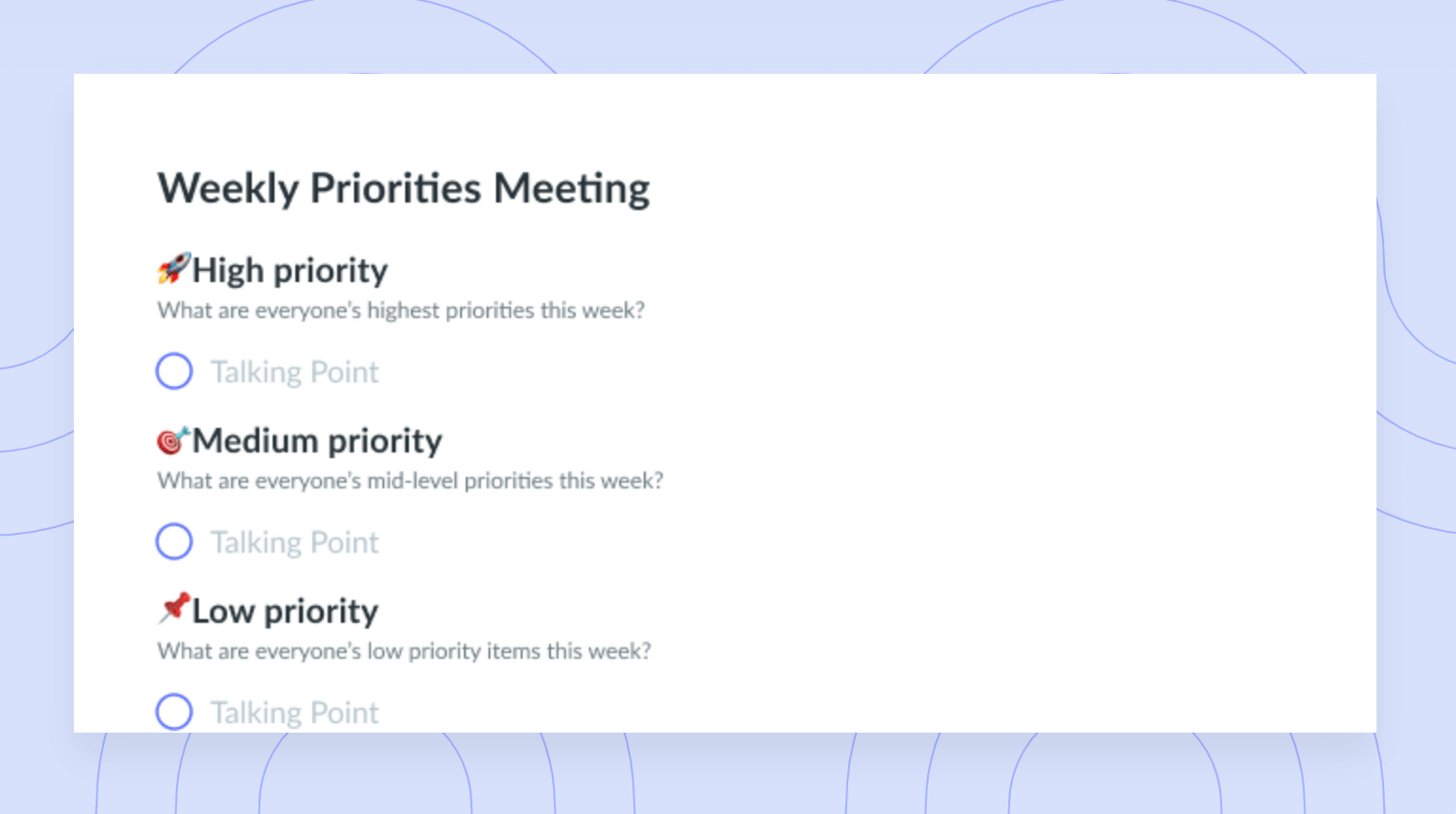
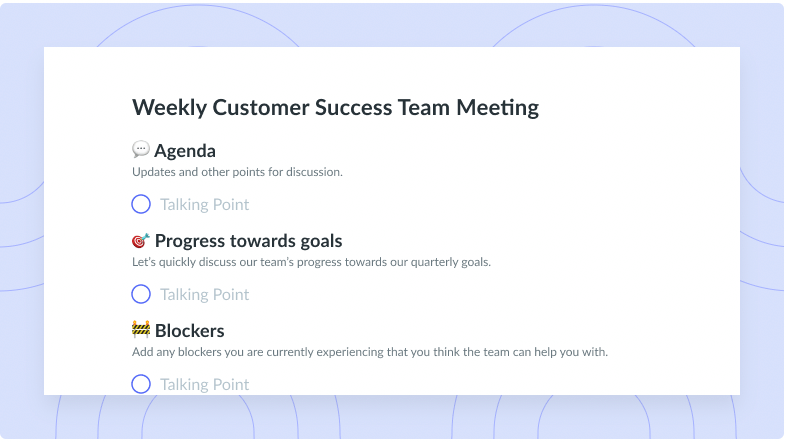
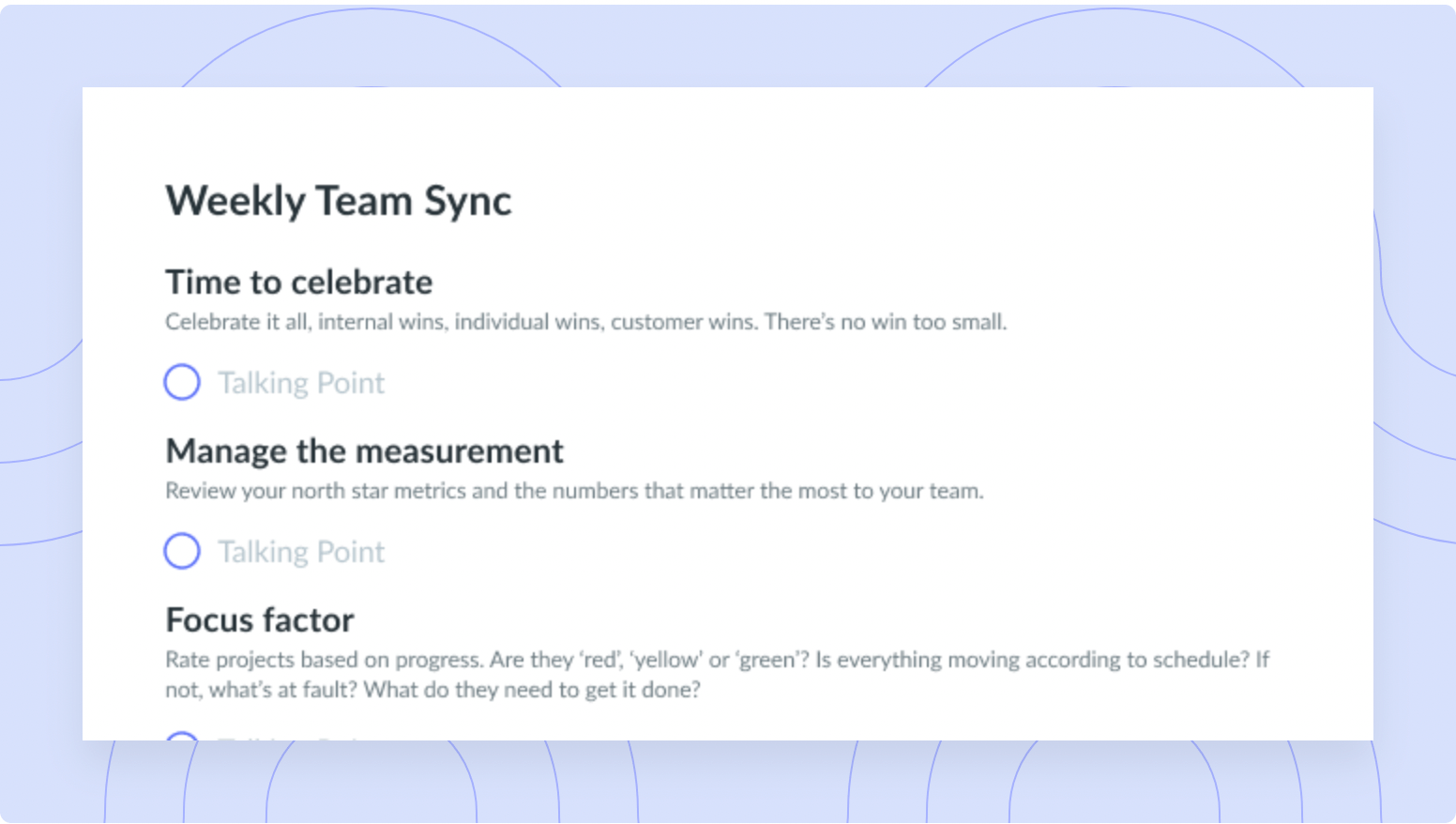
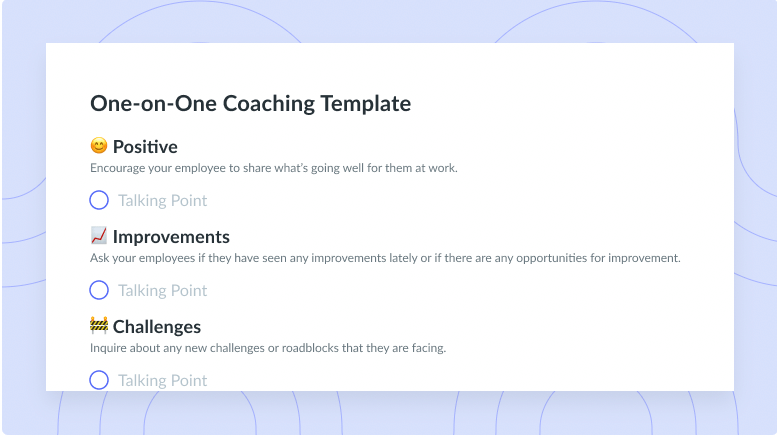
![What? So What? Now What? [Reflection Meeting] Template](https://fellow.app/wp-content/uploads/2021/08/What-So-What-Now-what-preview-v2.png)











